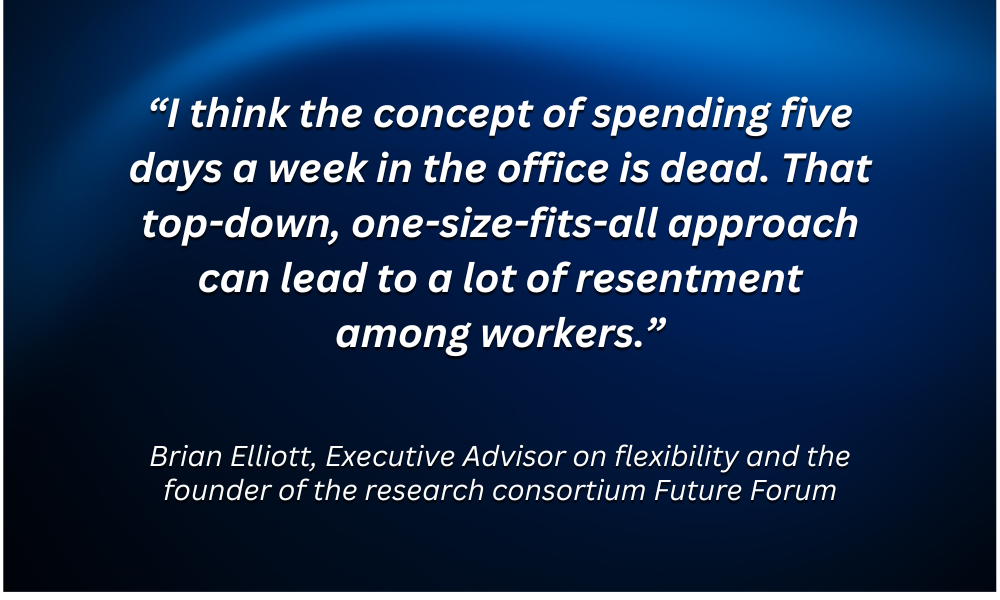
During the pandemic, offices shut down and many employees worked from home. In 2023, businesses began requiring people to come back to the office – be it full-time or hybrid. While work locations now vary, the way we think about business office furniture has changed as a result.
This blog will explore the return to work movement and its impact on business office furniture trends. Furniture manufacturers will also learn how to cater to their customer base without breaking the bank.
Understanding the Return to Work Movement

Source: CNBC.com
In 2024, some Fortune 500 companies instituted complete return-to-office policies. Many companies are choosing more flexible work policies to retain talent and handle employee pushback. Here are three work scenario reasonings:
- Full-time in Office: Some businesses are asking employees to return to the office full-time. They believe that in-person collaboration results in better productivity and improved corporate culture.
- Hybrid Work Models: Many companies are choosing a hybrid model. In this model, employees divide their time between the office and working from home. Hybrid work offers flexibility and can help balance employee work-life needs.
- Continued Remote Work: Still other companies have decided to keep remote work as a permanent option. They find that it can lower costs, increase employee satisfaction, and allow them to hire a global workforce.
Impact on Business Office Furniture Sales
The shift in work models has led to a diverse range of business office furniture needs. While many remote workers already had an office setup, others simply scraped by with the kitchen table. They seek comfortable office furniture, whether they work fully remote or hybrid.
While some types of business office furniture are in higher demand, others are in decline because of changing dynamics. Understanding these shifts can help furniture manufacturers adjust their strategies and offerings accordingly.
Rising Demand
1. Ergonomic Desks and Workstations
As more people return to the office, whether full-time or part-time, health and well-being in the workplace matter more than ever. Ergonomic desks and adjustable workstations are in high demand and crucial for maintaining productivity and preventing workplace injuries.
Key Features:
- Height Adjustable Desks: Let users change between sitting and standing. This helps improve posture and lowers the risk of back pain. They are ideal for offices that prioritize health and wellness and encourage movement throughout the day.
- Modular Desks: These can be easily changed to fit different working styles and office layouts. This makes them great for flexible work environments.
2. Comfortable Seating
Comfortable and supportive seating is critical, especially as employees spend long hours at their desks. Ergonomic chairs are designed to provide optimal support, reducing the risk of musculoskeletal problems.
Key Features:
- Adjustable Height and Tilt: Allows users to customize their chair to their body’s needs.
- Lumbar Support: Provides crucial support to the lower back, helping maintain the spine’s natural curve.
- Breathable Materials: Chairs with breathable fabrics or mesh backs promote air circulation, keeping users cool and comfortable.
3. Compact Storage Solutions
As businesses adapt to hybrid work models, the need for efficient use of office space becomes essential. Compact and modular storage business office furniture solutions help maximize available space without cluttering the office.
Key Features:
- Mobile Pedestals: These are easy to move and fit under desks. They offer convenient storage for personal items and documents.
- Wall-Mounted Shelves: Ideal for small offices, these shelves keep items off the floor, saving space.
- Modular Storage Units: These can be stacked or arranged in various configurations to suit different needs, offering flexibility in organizing office materials.
4. Collaborative Furniture
In hybrid and in-office work environments, collaboration is key. Furniture that facilitates teamwork and communication is increasingly important as businesses strive to maintain a sense of community and collective productivity.
Key Features:
- Modular Tables: These can be easily rearranged to accommodate different group sizes and meeting formats.
- Collaborative Seating: Soft seating arrangements, like lounge chairs and sofas, create informal meeting areas that encourage spontaneous collaboration.
- Whiteboards and Dividers: Mobile whiteboards and room dividers help with brainstorming and make meeting spaces more flexible.

Frontier ERP can easily be integrated into customer portals, giving your clients more control over their designs.
Declining Demand
1. Traditional Desks and Workstations
Large, stationary desks that were once staples of office environments are becoming less desirable. As companies move towards flexible and adaptable workspaces, the demand for bulky, non-adjustable desks is decreasing.
2. High-walled Cubicles
High-walled cubicles used to be a symbol of corporate offices. Now, they are being replaced by open-plan spaces and areas for collaboration. The trend towards more open, communicative environments has led to a decline in the need for these enclosed workstations.
3. Large Conference Tables
With the rise of hybrid work models and virtual meetings, the need for large conference tables has diminished. Companies are opting for smaller, modular tables that can be easily reconfigured for various meeting sizes and purposes.
4. Formal Meeting Room Furniture
The shift towards casual and flexible meeting spaces has reduced the demand for traditional, formal meeting room furniture. Companies prefer business office furniture that supports a variety of meeting styles like relaxed brainstorming sessions.
Enhancing Consumer Demand with Innovative Solutions
The business office furniture market is evolving rapidly. With the rise of hybrid work models and new technology, furniture manufacturers must adapt to meet new demands. Here are some strategies to boost sales in the current office/hybrid work environment:
1. Embrace Ergonomic and Flexible Designs
- Focus on Health and Comfort: Highlight the benefits of ergonomic desks and chairs that support health and productivity. Products like height-adjustable desks and chairs with lumbar support are in high demand.
- Customizable Options: Offer business office furniture that can be easily configured to meet individual needs. Modular designs that can be reconfigured to suit different office layouts are particularly attractive.
2. Offer Hybrid and Home Office Solutions
- Compact and Portable Furniture: Develop furniture solutions that fit well in home offices, like compact desks and transitional tables.
- Aesthetic Appeal: Design business office furniture that blends seamlessly with home decor while providing the functionality needed for work.
- Bundled Packages: Create custom home office packages that include a desk, chair, and storage solutions. A bundled package makes it easier for customers to set up their workspace with their own flair.
3. Highlight Sustainable and Smart Furniture
- Sustainable Materials: Use eco-friendly materials and processes. Promote your commitment to sustainability, which is increasingly important to consumers.
- Smart Furniture: Integrate technology into your products. Smart desks with built-in charging ports or chairs with posture-monitoring sensors or massagers can differentiate your offerings.
Easily Add New Product Lines and Bundles With Frontier ERP
Recent changes have created new opportunities for furniture manufacturers to develop innovative product lines tailored to office, home, and hybrid work settings. Frontier ERP can play a pivotal role in helping you streamline your operations, enhance product offerings, and boost sales.
Efficient Product Development
Streamlined Design and Production Processes
- Product Configuration Management: Frontier ERP’s parametric product configurator allows users to design and customize new products quickly. This tool allows users to create different options and setups for desks, chairs, and storage for both office and home use.
- Prototyping and Testing: The ERP system can manage and track the prototyping phase, ensuring that new designs meet set standards before production. This reduces the time and cost associated with bringing new products to market.
Enhanced Customization and Personalization
Meeting Diverse Customer Needs

Take the hassle out of introducing new product lines with Frontier ERP’s secure and flexible product data and configuration management features.
- Custom Order Management: Frontier ERP enables manufacturers to manage custom orders efficiently. Customers can specify their preferences for materials, colors, sizes, and more! The system ensures that these custom requirements are accurately captured and fulfilled.
- Flexible Bundling Options: The system supports the creation of product packages. Manufacturers can easily design and offer bundles. Options could include ergonomic desks, adjustable chairs, and compact storage solutions, appealing to both office and home office buyers.
Improved Supply Chain Management
Ensuring Timely Delivery and Cost Efficiency
- Inventory Control: Frontier ERP provides real-time visibility into inventory levels, helping you maintain optimal stock levels and avoid overproduction or stockouts. This is crucial for managing new product lines and bundles, ensuring that components are always available when needed.
- Supplier Collaboration: The ERP system facilitates better collaboration with suppliers, ensuring that raw materials and components are delivered on time. This reduces delays and keeps production schedules on track.
Robust Production Planning and Scheduling
Optimizing Manufacturing Processes
Frontier ERP comes equipped with secure product data and configuration management features that allow you to easily incorporate new product lines.
- Automated Scheduling: Frontier’s scheduling tools help optimize production workflows, ensuring that manufacturing resources are used efficiently. This is particularly important when introducing new product lines that may require different production techniques or timelines.
- Capacity Planning: The system can analyze production capacity and identify potential bottlenecks. This allows furniture manufacturers to adjust resources and schedules proactively to meet demand for new business office furniture products.
Data-Driven Decision Making
Leveraging Analytics for Strategic Insights:
- Business Intelligence: Frontier’s analytics and reporting tools provide you with valuable insights into market trends, customer preferences, and sales performance. Business office furniture manufacturers can use this data for strategies regarding potential new product lines and bundled purchases.
- Performance Metrics: Frontier ERP tracks key performance indicators (KPIs) across your company. This helps you evaluate the success of any new product initiatives and identify areas for improvement.
Cost Management and Financial Planning
Maximizing Profitability
- Cost Tracking: Frontier enables detailed tracking of product costing, from raw materials to finished goods. This helps you identify cost-saving opportunities and price their new product lines competitively.
- Financial Forecasting: Our financial management module supports accurate forecasting and budgeting. This helps you ensure that new business office furniture line investments are aligned with company goals and financial constraints.
Integrated Customer Portals for Enhanced Service
Improving Customer Experience
- Self-Service Portals: Frontier ERP can easily integrate with your customer portals too! That way all of your data is always up-to-date. Enhance customer loyalty and let your clients design and quote orders in real time.
- Order Tracking: Customers can also monitor their order status in real time. This shows transparency and reduces inquiries about delivery times.
Conclusion
The return to work movement is reshaping the business office furniture market. As companies adapt to new work models, their furniture needs are changing. To thrive in this evolving market, manufacturers should focus on innovation, sustainability, and exceptional customer service.
Furniture manufacturers can stay competitive by offering customized solutions, ensuring production efficiency, and managing costs effectively. ERP systems play a crucial role in achieving these goals. By leveraging ERP systems like Frontier, you can become the furniture manufacturer of choice, meeting the diverse needs of clients worldwide.
Are you ready to take your furniture manufacturing business to the next level? Contact us today for a consultation or a demo of our ERP solutions. Let’s work together to create a brighter future for your business.




